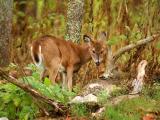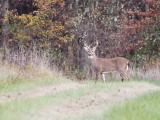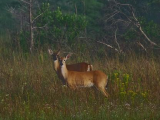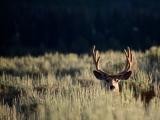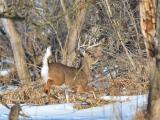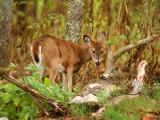Using dogs to detect the presence of chronic wasting disease (CWD) in deer droppings shows promise, according to new findings published this week in Prion.
In a proof-of-concept study by University of Pennsylvania School of Veterinary Medicine (Penn Vet) researchers, trained dogs—two Labrador retrievers and a Finnish spitz—correctly identified CWD in 8 of 11 CWD-positive samples and had an average false-positive rate of 13%.
Highly sensitive noses
"We were already quite certain that the dogs could detect the volatile organic compounds released by chronic wasting disease in feces," says Amritha Mallikarjun, PhD, a postdoctoral researcher in Penn Vet's Working Dog Center and the study's first author, in a University of Pennsylvania news release. "Not only did we show this was possible, but we also answered a second, more interesting question, which is, 'Can they detect the disease in a simulated field setting, as they would if we were using the dogs to find the disease in the landscape of a forest or on a deer farm?' "
CWD is caused by infection with a prion, which is a misfolded protein. It causes wasting of the body, is always fatal, and affects cervids such as deer, elk, and moose. It has yet to be detected in humans, but scientists fear it could one day make that jump.

Because of their proficiency at detecting scents and distinguishing a particular odor out of hundreds of others, dogs have been used to detect a variety pathogens, including Clostridioides difficile and SARS-CoV-2. This summer researchers will conduct a separate trial in the field on the Blackfeet Indian Reservation in northwestern Montana using other dogs to detect CWD.
The dogs selected for the Prion study were trained to seek out scents on a large scent wheel with eight paddles at the end of its spokes. They showed a clear change in behavior when they detected their target odor, and they left the scent wheel when the target odor was not on one of the paddles. Training involved a series of tests to hone the dogs' ability to detect CWD in deer droppings.
In a field test across a grassy expanse with scattered trees, the dogs correctly identified 8 of the 11 CWD-positive scat samples. They incorrectly alerted their handlers on 14 of 78 samples that did not contain CWD prions, for a 13% false-positive rate.
"This study is the first to demonstrate that trained detection dogs can be used as an antemortem [before-death] test for CWD," the authors concluded, "These results suggest that dogs can be trained to differentiate CWD-positive faeces from CWD-negative faeces in both laboratory and field settings."
As we move forward and work with dogs that are specifically trained to search in a field setting and devote their entire lives to detecting this odor, they are going to do an even better job.
The study was a cooperation among The Working Dog Center, the Pennsylvania Department of Agriculture, and the Wildlife Futures Program, a partnership between Penn Vet and the Pennsylvania Game Commission.
Hopes of catching outbreaks early
"We learned a lot through the study and are now set up well to continue refining our training,” says Cynthia Otto, DVM, PhD, the senior author on the study and director of the Working Dog Center.

Shelby Wise / Wise K9 Photography
"Given the amount of time that we trained these dogs and the novel environment, not to mention the fact that these are pet dogs and not trained search dogs, our results are promising," says Mallikarjun. "As we move forward and work with dogs that are specifically trained to search in a field setting and devote their entire lives to detecting this odor, they are going to do an even better job."
The Wildlife Futures Program is already working with the handlers of actual detection dogs on how to canvas fields and forests for CWD. The researchers believe that, although dogs don't represent a silver bullet against CWD, they may provide an early warning system, according to the news release.
"These dogs could increase the odds of catching an outbreak early," says Lisa Murphy, VMD, a study co-author and co-director of the Wildlife Futures Program.

